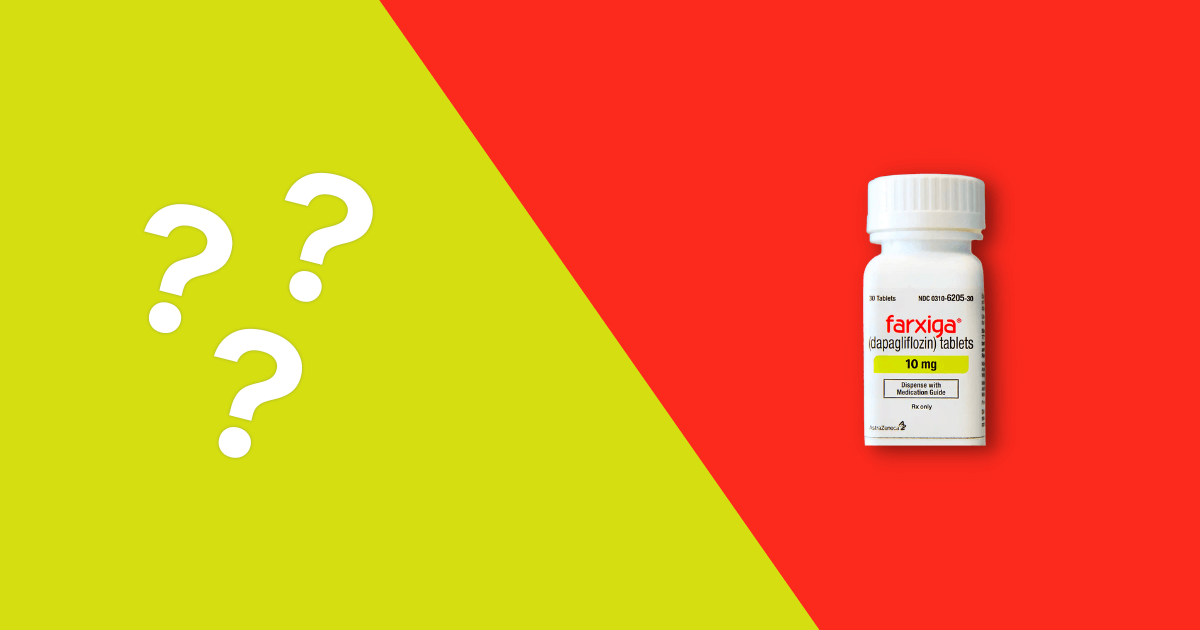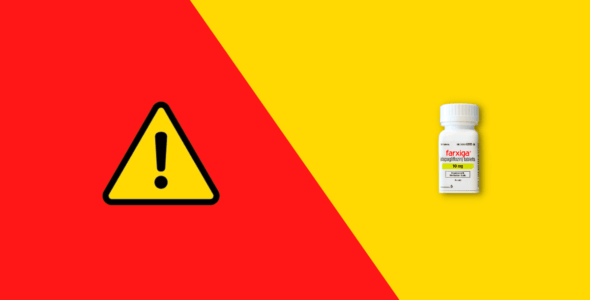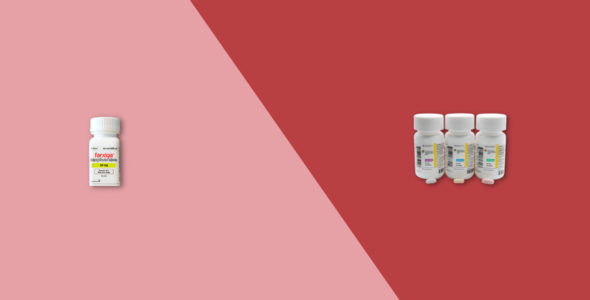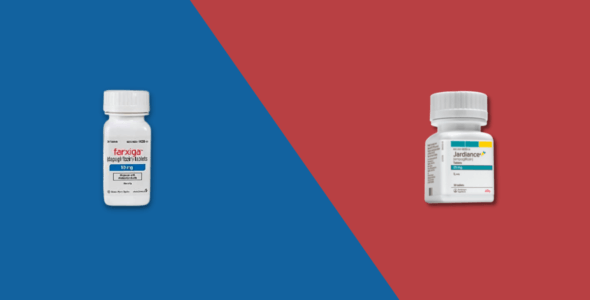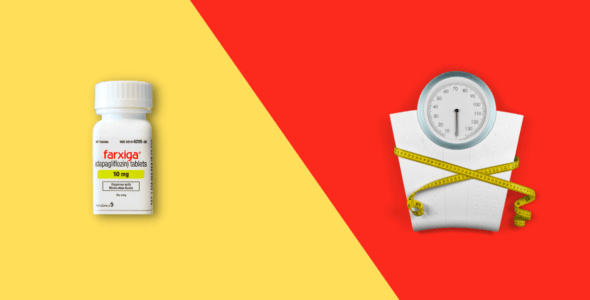Farxiga alternatives: which other diabetes medications can I take?
Table of contents
Farxiga is the brand name for an FDA-approved medication manufactured by AstraZeneca. It is classed as a sodium-glucose cotransporter (SGLT2) inhibitor and is used to reduce high blood sugar levels in people who have type 2 diabetes. It is also used in certain people to lower the risk of hospitalization for heart failure. It is approved to be used in people with type 2 diabetes for:
- Improving blood sugar levels when being used in combination with changes to diet and exercise
- Reducing the risk of hospitalization for heart failure in people with heart disease or risk factors for heart disease
In individuals with heart failure with or without type 2 diabetes, Farxiga is approved for reducing the risk of hospitalization for heart failure or cardiovascular death in people with reduced ejection fraction. For those with chronic kidney disease that could worsen, Farxiga is approved for reducing the risk of:
- End-stage kidney disease
- Lowered glomerular filtration rate (GFR)
- Hospitalization for heart failure
- Cardiovascular death
The active ingredient in Farxiga is called dapagliflozin. When absorbed into your bloodstream, dapagliflozin slows down the rate at which your kidneys absorb glucose from your blood. This causes your kidneys to release sugar into your urine. Your blood sugar levels then fall as you urinate. Farxiga can also be used in combination with some other diabetes medications, including insulin, metformin, or a sulfonylurea.
Farxiga is not approved to treat type 1 diabetes and should not be used to treat diabetic ketoacidosis (DKA).
What are the side effects of Farxiga?
The most common possible side effects of Farxiga in clinical trials include:
- Dehydration, changes in urination, dizziness, back pain
- Constipation
- Weight loss
Farxiga can cause more serious side effects, including:
- Low blood sugar (hypoglycemia)
- More serious urinary tract infections (UTI)
- Inflammation of the pancreas (pancreatitis)
- Diabetic ketoacidosis
- A rare bacterial infection that damages the tissue under the skin in the area between the anus and genitals (necrotizing fasciitis)
- Unusual tiredness, nausea, vomiting, abdominal pain, trouble breathing
- Ketoacidosis (increased ketones in your blood or urine)
- Increase in your cholesterol levels
If you experience any of these serious side effects, you should stop taking Farxiga and seek medical attention immediately. You are encouraged to report the negative side effects of prescription drugs to the FDA (Food and Drug Administration). Visit www.fda.gov/medwatch, or call 1-800-FDA-1088.
RELATED: Farxiga side effects and how to avoid them
What are the cheaper alternatives to Farxiga?
Alternative treatment options are available to Farxiga, some of which may be cheaper and more cost-effective to use. Glipizide is a generic alternative costing significantly less than Farxiga. Glipizide belongs to the drug class known as sulfonylureas. It is a much older treatment for diabetes, associated with side effects such as hypoglycemia (low blood sugar level), and weight gain.
Metformin is another generic drug, and probably the most well-known treatment for diabetes other than insulin. Metformin is classed as a biguanide, is also cheaper than Farxiga, and does not cause side effects such as hypoglycemia and weight gain.
Natural alternatives to Farxiga
Natural alternatives to Farxiga may include non-prescription alternatives such as herbal or homeopathic supplements. It is important to be aware however that products sold or supplied as natural remedies for the treatment of diabetes will not have undergone the same rigorous testing prescription drugs have, and may not be safe or effective when managing the symptoms of diabetes. Speak to a healthcare professional for medical advice about potential allergic reactions or drug interactions before using natural alternatives.
Changes in lifestyle such as a low-carb diet, exercise, and weight loss are the best natural way to help manage your diabetes. Speak to your doctor or dietitian for advice on creating your own personal diet plan.
Farxiga vs Jardiance
Jardiance belongs to the same class of drugs as Farxiga and has similar side effects to Farxiga such as urinary tract infections and genital yeast infections. Jardiance also has a diuretic effect, similar to Farxiga. Jardiance and Farxiga both help to get rid of fluid from the body at the same time as reducing blood sugar levels.
Both drugs are effective for the treatment of heart failure with reduced ejection fraction (the blood pumped out of your heart with each heartbeat) and high blood pressure. Jardiance reduces the risk of death in patients with high cardiovascular risk and Type 2 diabetes (as does Farxiga). Farxiga is also recommended for the reduction of the risk of kidney problems and the progress of kidney disease in patients with chronic renal disease (Jardiance is not).
RELATED: Farxiga vs Jardiance
Can Jardiance and Farxiga be taken together?
Jardiance and Farxiga are not recommended to be used together. Both drugs belong to the same class of drugs and interactions were found between Farxiga and Jardiance when taken together.
Are Farxiga and Rybelsus the same?
No. Rybelsus belongs to a class of drugs known as glucagon-like peptide-1 (GLP-1) receptor agonists. GLP-1 agonists may help with weight loss and Rybelsus helps to reduce cardiovascular risk, but is not recommended for the treatment of heart failure.
Which is better Januvia or Farxiga?
Januvia is classed as a dipeptidyl peptidase-4 (DPP-4) inhibitor. Januvia does not cause side effects involving the genitals or urinary organs, and does not cause low blood pressure when standing (orthostatic hypotension) which Farxiga does. Januvia is however expensive and is not recommended for the protection of the kidneys or heart.
Is there a generic version of Farxiga?
No. Currently there is no generic equivalent of Farxiga available in the U. S.
Is Farxiga the same as Trulicity?
No. Trulicity also belongs to the class of drugs known as glucagon-like peptide-1 (GLP-1) receptor agonists. GLP-1 agonists. Trulicity is injected once-weekly for the treatment of diabetes.
Which is better Invokana or Farxiga?
Farxiga and Invokana (canagliflozin) are diabetes drugs with many similar side effects. However, Farxiga has been reported to increase levels of LDL cholesterol, and to increase the risk of bladder cancer which Invokana does not. Farxiga may also cause further damage to kidneys in patients already suffering from moderate to severe kidney damage.
Can you stop taking Farxiga suddenly?
Do not stop taking Farxiga suddenly, without speaking to your healthcare provider first. Stopping treatment suddenly may cause your condition to become worse.
What is the safest drug for type 2 diabetes?
Most healthcare professional agrre that metformin is the safest drug available for type 2 diabetes. It has been used for many years, is safe and effective, and not too expensive. Metformin is recommended as the drug of choice for diabetes by the American Diabetes Association (ADA).
What is better Ozempic or Farxiga?
Ozempic is the brand name for a glucagon-like peptide-1 receptor agonist (GLP-1 agonists), that helps to promote the release of insulin and reduce the secretion of glucagon from the liver. Ozempic may cause reduced blood glucose levels, nausea, vomiting, and diarrhea as a common side effect. Ozempic is less expensive in comparison to Farxiga and may be more cost effective.
Which is better Farxiga or metformin?
Metformin is classed as a biguanide and a first line treatment for diabetes. Metformin is less expensive and more effective than Farxiga and is more suitable for use in women who are pregnant or breastfeeding. Metformin is not recommended to be used in patients who have advanced renal disease, or gastrointestinal side effects such as diarrhea. .
How long has Farxiga been on the market?
Farxiga was approved by the FDA in 2014 for use in adults with type 2 diabetes in combination with diet and exercise.
Is Farxiga an insulin?
Farxiga is a SGLT-2 inhibitor, a once-daily treatment that makes your kidneys get rid of excess glucose through your urine. Farxiga works independently of insulin.
Medically reviewed
A medical professional has reviewed this article.


Jamie Winn, PharmD
Jamie Winn, PharmD
Dr. Jamie Winn received his Doctor of Pharmacy in 2002 from the University of South Carolina College of Pharmacy, Columbia, SC. Jamie is a medical reviewer for NiceRx.

